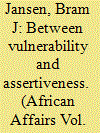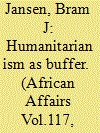| Srl | Item |
| 1 |
ID:
085984


|
|
|
|
|
| Publication |
2008.
|
| Summary/Abstract |
Resettlement to third countries is regarded as a durable solution to refugee crises. In Kakuma refugee camp in north-west Kenya, seeking a better life in industrialized countries has become a preoccupation for many refugees. In this article the effects of the practice of third country resettlement on the camp population are explored. Increased ease of communication with the diaspora, expanded knowledge of entitlements, and the high visibility of resettlement processing within the camp have increased the demand for resettlement. The article argues that the result is an environment that encourages refugees to cheat through claiming insecurity and negotiating vulnerability. Refugees come to believe that resettlement is something that can be actively achieved, rather than a benefit extended only to the genuinely vulnerable
|
|
|
|
|
|
|
|
|
|
|
|
|
|
|
|
| 2 |
ID:
155003


|
|
|
|
|
| Summary/Abstract |
This paper aims to contribute to debates about humanitarian governance and insecurity in post-conflict situations. It takes the case of South Sudan to explore the relations between humanitarian agencies, the international community, and local authorities, and the ways international and local forms of power become interrelated and contested, and to what effect. The paper is based on eight months of ethnographic research in various locations in South Sudan between 2011 and 2013, in which experiences with and approaches to insecurity among humanitarian aid actors were studied. The research found that many security threats can be understood in relation to the everyday practices of negotiating and maintaining humanitarian access. Perceiving this insecurity as violation or abuse of a moral and practical humanitarianism neglects how humanitarian aid in practice was embedded in broader state building processes. This paper posits instead that much insecurity for humanitarian actors is a symptom of the blurring of international and local forms of power, and this mediates the development of a humanitarian protectorate.
|
|
|
|
|
|
|
|
|
|
|
|
|
|
|
|
| 3 |
ID:
160889


|
|
|
|
|
| Summary/Abstract |
This article explores how the humanitarian presence and programs in the disputed border area of Abyei between Sudan and South Sudan can be understood as a buffer between conflicting parties, rather than as mere assistance to a displaced population. It aims to contribute to debates about the spatial impact of humanitarian governance and the politicization of aid in protracted crisis contexts, and specifically in relation to territorial disputes and border struggles. It is based on ethnographic fieldwork in South Sudan between 2011 and 2013. The article argues that the humanitarian response became part of the politics of belonging that lies at the heart of the dispute. The very acts of labelling, categorizing, and maintaining the subjects of aid are highly political, such as the creation of the category of the ‘people of Abyei’ in contrast to refugees or Internally Displaced People. As a result, the interventions have sustained governance over the territory and can be understood as a humanitarian buffer that may shape the border area of Abyei for many years to come.
|
|
|
|
|
|
|
|
|
|
|
|
|
|
|
|